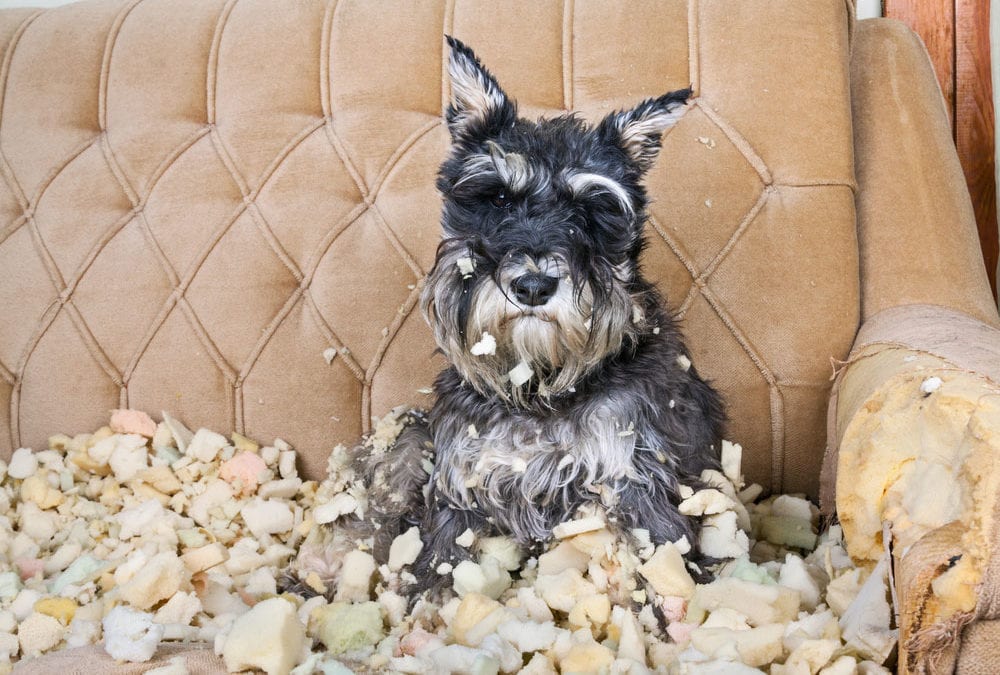Are you seeing behavior changes in your dog due to separation anxiety now that your family is going back to work or school? The team at Union Lake Veterinary Hospital is hearing reports of an increase in destructive behaviors and other problems during/post COVID-19 and questions about why the dog is suddenly misbehaving. Let’s explore the reasons behind these behaviors.
Most dogs want nothing more than to be with their loving owners. We have shared a lot more time together the past several months of the pandemic and that has strengthened the bond. Your dog probably enjoys the extra attention, exercise, and your company. When the time comes that we must return to work or school, it is a huge change for the dogs we are leaving home alone again.
Behavior Changes in Your Dog Due to Separation Anxiety
As with any major change in routine or schedule, dogs can become stressed and anxious. Pets rely on routine to make them feel secure, and any abrupt change in what they have learned to expect can lead to shifts in personality and behavior. Some pets become clingy, while others start acting out with behaviors like chewing, digging, and chronic barking.
Separation anxiety in dogs occurs when a dog has developed intolerance for being alone or away from their owner. This condition usually affects dogs who were not socialized, have a history of trauma, or have been rewarded for being hyper-attached to their owner. This condition arises in many pets whose owners return to work or school after a long stay at home. It is possible through retraining and redirection to reverse the effects of negative behavior and separation anxiety in pets.
Preparing Your Dog for Your Return to Work
Adjusting your dog to a new routine takes some planning and consistency. Over time, your furry friend will adapt to the change in work/school or other schedule disruptions. To make the transition a smooth one, implement the following steps.
1. Ease in to the new routine – The transition should go slowly, so that it doesn’t trigger fear and stress in your pet. To do this, you will need to increase your dog’s alone time incrementally. Leave for an hour or two each morning without your dog. Give them things to do in a separate room or crate while you work. Then, practice the new schedule by leaving for the whole day to assess how they react.
2. Keep calm and minimize your leaving and returning – When you overemphasize your dog’s response to leaving or get too excited when you return home, this reinforces your pet’s negative association with being left. Downplay their exuberance when you come home and remain upbeat, avoiding a long goodbye when you leave.
3. Provide enrichment for the day – Pets, like us, get bored when they are alone and act out of this boredom. If your dog is misbehaving, get them some enrichment toys. Kongs filled with peanut butter, a Nylabone, challenging puzzles that dispense treats or kibble, and new toys can make being home alone a positive thing.
4. Exercise your dog before you leave – A tired dog is one that is less likely to behave badly. Dogs need at least 20-30 minutes of activity each day. Plan to get up earlier in the morning so you can walk your dog or play a game that gets them moving. Upon returning from work, take them for another walk, play a game of fetch, or other form of exercise.
5. Redirect negative behaviors – There are several behaviors that emerge from separation anxiety. Many owners of dogs and cats notice an increase in digging, chewing, and scratching. Mimic the bad behavior by giving them a pet-friendly solution. If your cat likes to scratch, provide scratching posts and pads. If your dog likes to dig, give them their very own sandbox in the yard. Constant chewing is common in puppies and pets with anxiety, so provide lots of chew toys for them.
When Your Dog Misbehaves
A dog who acts up every time the owner leaves is upsetting and problematic for the entire family. The behavior can result in destruction of property and put your dog at risk for escape and injuries, as well as the ongoing impact of stress. If you see behavior changes in your dog due to separation anxiety (or for any reason), please call us for a behavioral consultation. We can help you get to the bottom of your furry family member’s anxiety and fear.

